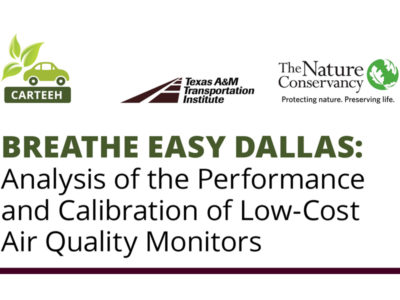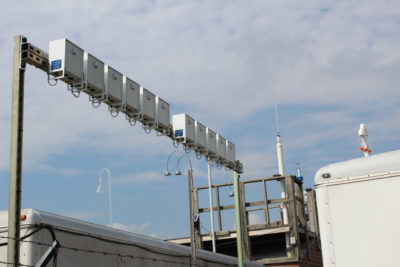 The Texas A&M Transportation Institute (TTI) and its Center for Advancing Research in Transportation Emissions, Energy and Health (CARTEEH), in collaboration with The Nature Conservancy in Texas (TNC), recently completed a study entitled Analysis of the Performance and Calibration of Low-Cost Air Quality Monitors. The study assesses the performance and calibration of low-cost air quality monitors continuously measuring four criteria air pollutants in Dallas, Texas.Produced as a part of Breathe Easy Dallas, a collaboration between TNC, TTI, CARTEEH, the City of Dallas, and other health and community organizations in the Metroplex area, the study seeks to further understanding about how local air monitoring can help improve public health in high-risk populations.
The Texas A&M Transportation Institute (TTI) and its Center for Advancing Research in Transportation Emissions, Energy and Health (CARTEEH), in collaboration with The Nature Conservancy in Texas (TNC), recently completed a study entitled Analysis of the Performance and Calibration of Low-Cost Air Quality Monitors. The study assesses the performance and calibration of low-cost air quality monitors continuously measuring four criteria air pollutants in Dallas, Texas.Produced as a part of Breathe Easy Dallas, a collaboration between TNC, TTI, CARTEEH, the City of Dallas, and other health and community organizations in the Metroplex area, the study seeks to further understanding about how local air monitoring can help improve public health in high-risk populations.
According to its website, TNC is a “global conservation organization dedicated to conserving the lands and waters on which all life depends. Guided by science, TNC creates innovative, on-the-ground solutions to the world’s toughest challenges so that nature and people can thrive together.”
“The Nature Conservancy has been so pleased to partner with [TTI, CARTEEH], the City of Dallas, and public health and community leaders on Breathe Easy Dallas,” says Kathy Jack, Dallas healthy cities program director at The Nature Conservancy in Texas. “This phase one study on low-cost air quality monitors represents a pivotal step in helping stakeholders—here in Dallas and beyond—understand how to utilize emerging technologies in support of public health goals.”
Led by TTI Associate Research Scientist Haneen Khreis, her research team, and Kathy Jack of TNC, the study assessed the performance and calibration of 12 low-cost air quality monitors continuously measuring four air pollutants in Dallas, Texas, over 18 months.

The study finds that though the absolute air pollution readings from low-cost air quality sensors deviated from the traditional high-cost reference monitors’ readings, the low-cost sensors’ readings tracked the reference monitors’ air quality trends over time relatively well. The low-cost air quality sensors were also able to present a more accurate picture when air quality was categorized using the U.S. Environmental Protection Agency’s (USEPA) Air Quality Index (AQI), rather than presenting the results as absolute measurements of air pollution concentrations.
The AQI is a calculated index value used by the USEPA to relay information about air quality and its impacts on human health to the public so they can avoid potentially harmful situations.
The data collected shows that value exists in a broader deployment of well-calibrated low-cost monitors to track air quality trends over time and compare air pollution levels and health-related parameters over larger areas than is possible with more expensive reference monitors. Using these monitors may help shine a light on the reasons behind public health outcome variations within cities.
“To the best of our knowledge, this work represents one of the longest durations for assessing the performance and calibration of low-cost air quality sensors. It was a comprehensive exercise that investigated some open research questions we identified,” notes Khreis. “Quantifying the performance of low-cost sensors in various real-world conditions is essential so that we use the sensors in ways commensurate with their data quality.”
Low-cost air quality sensors are emerging technologies and are subject to ongoing research and development. More details on the study methods and findings can be found at https://www.carteeh.org/breathe-easy-dallas-analysis-of-the-performance-and-calibration-of-low-cost-air-quality-monitors/.